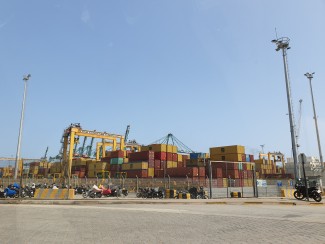Expanding agricultural production and profitability is pulling young men away from battlefields to fields.
In the Central African Republic (CAR), fresh maize cobs take on a deep yellow colour, almost orange. For farmers in a country plagued by conflict and food insecurity, these cobs are a ray of hope. Maize and other crops can only be grown in areas that are safe enough to farm. Elsewhere, armed groups often storm fields and burn them along with farmers' granaries.
Maize fields in communities less affected by conflicts are therefore treasured as they bring food, income – and peace. The district of Mboko-Landja in the south of the country is one such lucky area where communities can live off the land. This is a privilege in CAR which is currently facing a food crisis. According to the UN, humanitarian needs in the country are at their highest level in five years. The resurgence of armed violence and the recession of the economy have left six out of every 10 citizens, or 3.1 million people, in a state of great vulnerability.
Encouraging yields amidst conflict
Supporting farmers and agricultural cooperatives in a post-conflict context is not what funders of international aid often consider a safe bet. But turning swords into ploughs can pave a sustainable path out of conflict for communities, as results from a project supported by the Enhanced Integrated Framework in four districts of the country show.
Mr. Samedi Letromo is president of the Mboko-Landja Maize Cooperative, one of the groups participating in the project. The cooperative’s cultivated area increased from eight to 11 hectares from 2020 to 2021, doubling production from 5,200 to 10,345 tons of maize. He attributes this to the multifaceted support his organisation has received, including tools, seeds, trainings for farmers, and even new warehouses to store products.
As a result, the cooperative's income increased from Central African Franc (XAF) 1,040,000 (USD 2,080) in 2020 to XAF 2,275,900 (USD 4,551) in 2021. "This allowed our 250 members to improve their lives," says Letromo. "With the extra money, they were able to visit a doctor and buy medication. They could send their children to school and afford to buy them supplies. Some of them made improvements to their homes, making them more robust and comfortable."
Plowing through social tensions
More importantly, increasing the prosperity of the cooperative’s members is strengthening social cohesion in areas where indigenous communities share land and space with the Muslim Fulani community. CAR is a predominantly Christian and animist country and Muslim communities have historically faced discrimination or been used as scapegoats to explain the rise of armed militia. In Kémo district, in the heart of the country, for example, groups of indigenous populations and those of the Fulani community specialising in maize production have learned to live and harvest together.
Mr. Edmond Mologodo, the project coordinator at the Ministry of Trade and Industry, says cohabitation between the two communities has been difficult during periods of high political tension against a backdrop of religious discrimination. In this context, peace and reconciliation have been central to the project’s activities.
"Fulani groups were encouraged by the project to become members of the Kémo maize producers' cooperatives," says Mologodo. Since then, the Fulani community has been working with indigenous people on the same plots of land.
For ordinary CAR citizens, trade can be an escape from poverty and conflict. In the framework of the national disarmament, demobilisation, repatriation, and reintegration (DDRR) scheme, many ex-combatants have opted for small-scale trade or agriculture. Supporting agricultural cooperatives makes it more enticing for especially young men to swap their guns for sickles.
Trading guns for sickles
In a country with few opportunities, educating young people that they have alternatives to war is an important part of the work of the Ministry of Trade. "Maize production can reduce the burden of poverty on the rural populations that are most affected by the violence of armed groups," says Mologodo. The education includes visiting schools and talking to students about maize, sesame or palm farming, along with other small trade opportunities. Positive results, such as those shown by the Mboko-Landja cooperative, help convince young people that there is an income and a life to be made from farming.
"The hope and interest of the populations in the project is great every time we visit them," the official says.
Supporting the expansion of agriculture in areas so close to conflict and instability can feel as tenuous as the maize stems swaying in the wind. All that has been achieved can be blown away in one moment. But for the farmers working hard in their field, hope for peace is the colour of these yellow maize cobs.
Photo by Christophe Maertens on Unsplash
If you would like to reuse any material published here, please let us know by sending an email to EIF Communications: eifcommunications@wto.org.



